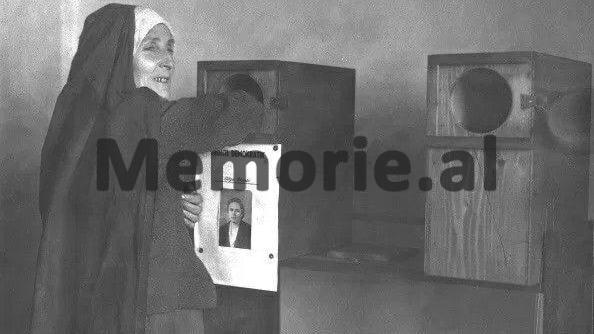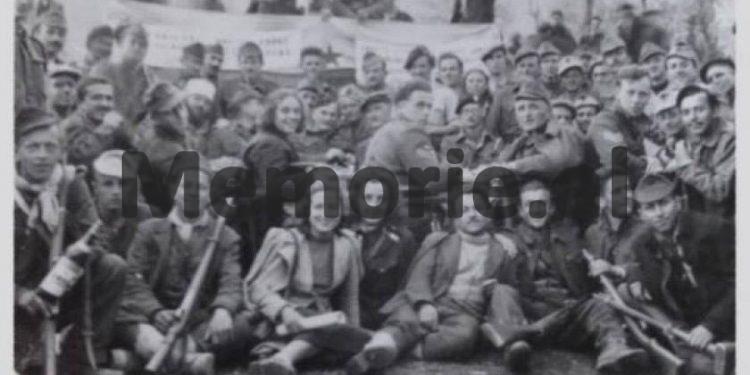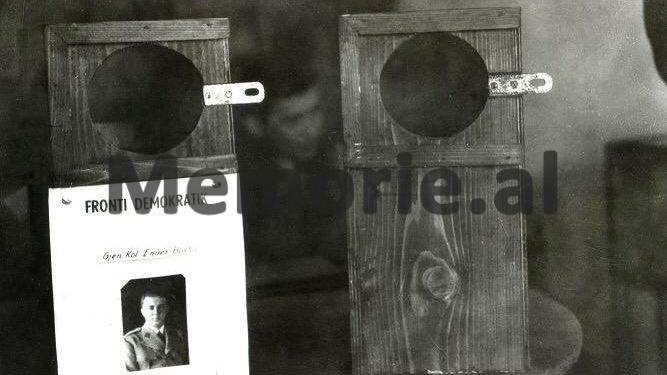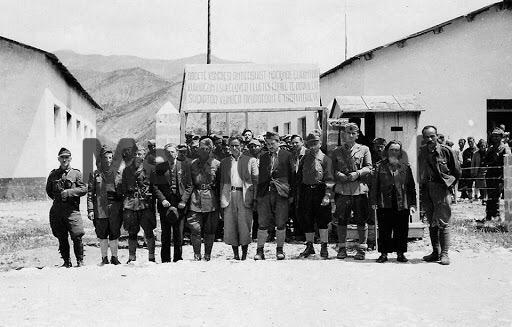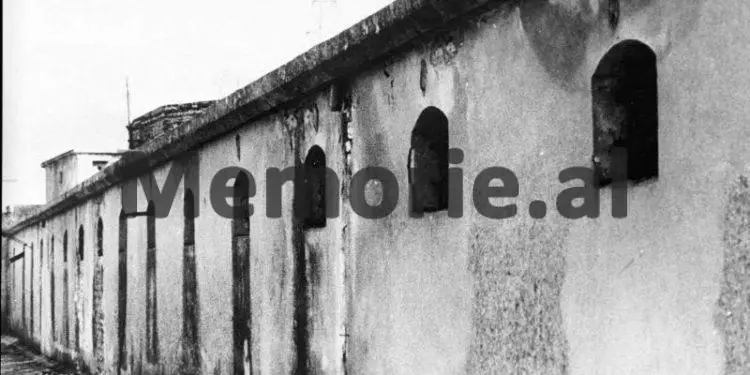Dashnor Kaloçi
Memorie.al publishes the unknown story of Zenel Shehu from the village of Toç i Tepelena, where his father, Beqiri, for many years during the period of the Zog Monarchy, served as the Father of the Krahës Tekke, which during the years of Italian occupation of became one of the main bases of the Anti-Fascist War, as Zeneli himself was the commander of the “Velikolli” gang and later with the creation of the “Baba Abaz” battalion, in Donie of Kalivaç, he was appointed commissar of that battalion, having as deputy, Adil Çarçanin. Zenel’s discussion at the Përmet Congress that surprised all the delegates, as he opposed the placement of the five-pointed communist star on the Albanian flag and the reaction of Enver Hoxha who asked Omer Nishani, who was the kapadai who was speaking that language…?! The removal of Zenel during the war by the main leadership of the Communist Party, who did not even choose him as a candidate for the first parliamentary elections of December 2, ’45, from where Zenel resigned as deputy prefect of Tepelena and was returned to his village, taking care of the family affairs in agriculture. Arrest and torture in Gjirokastra Castle prison and the death penalty together with Baba Shefqet, Syrja Vasjari and Father Gjergj Sulin, by the Military Court headed by Bexhet Mema in ’48, as well as the persecution of family members in prisons and internment, which could not find his remains, which are still under the foundations of a building in Gjirokastra…!?
Years ago, in the period of Enver Hoxha’s communist regime, sometime in the late 1960s, when Gjirokastra builders were working to open the foundations of a new hotel being erected south of their city, they encountered a grave massive and a few feet further into a solitary tomb! This event, unusual for those times, was rumored throughout the city, passing by word of mouth, until someone claimed: “Yes, that lonely grave there, belongs to Zenel Beqir Shehu, so we were given the message, he he had to be buried separately from the others…”! That distant evening in the stone city, one of the workers, in complete secrecy, gathered the bones found in that mass grave, and together with those of the solitary grave, gathered them all in one corner, covering them with earth, with the hope that maybe one day, someone would deal with them…?! But it was not said, because those unfortunate bones are still found in that place today, because above them, a building was erected that today serves as a dental clinic…!
The well-known Shehu family, in Toç of Tepelena
Zenel Shehu, was the fifth son of Beqir Shehu, the father of Teqe e Toçi, in Krahës i Tepelena who served for many years there as a Bektashi cleric during the period of the Zog Monarchy. Sheh Beqiri known as a man of great influence, not only in religious circles, but throughout the South of Albania, since the first years of the last century, was sentenced to death by the Young Turks, accused of spreading Albanian books. In 1912, Sheh Beqiri, was a participant as a delegate of Tepelena in the declaration of independence in Vlora and one of the signatories of the act of Independence. In 1920, he took part in the War of Vlora where he was wounded during a battle and his patriotic activity continued further by also participating in the Congress of Lushnja, where he was again the delegate of Tepelena, together with Arshi Shehu. Having a great patriotic activity and as one of the most listened to people of that area, Sheh Beqiri, his house is burned by the Greek andarts. In 1924, he joined the fanatical forces as a very active man and in January 1925, he was sentenced to death by the Special Court, as a participant in the overthrow of the government of Shefqet Vërlac in June 1924, a sentence which was pardoned by Zogu, after the intervention of a relative of his, who was a member of the Albanian Parliament and an influential man in Zogist circles. After being pardoned by Zogu, Sheh Beqiri no longer interfered in politics, but only engaged in his religious activity in the Toçi Tekke, where he died in 1940, being buried with great honors by the entire population. of that area and the South of Albania.
Zenel Shehu, in his father’s way
Zeneli was born in the village of Toç in 1918, where he received his first elementary school lessons in Krahës, to continue his unique education in Tepelena. After finishing his studies in his hometown, Zeneli would go on a state scholarship to the Commercial School of Vlora, where he excelled in his studies, but he could not finish his studies because he was expelled from school, because he hit the classroom. , the Italian teacher, because he despised the Albanian flag. This event at that time caused a great commotion not only in the Commercial School of Vlora, but in the whole coastal city. For Zenel’s return to school, there were some interventions from his father’s friends, up to Qazim Kaculi, but that again became impossible. After being expelled from school, Zeneli was called up as a soldier and sent to serve in the Tropoja and Puka area. In those areas, Zenel was also found in April 1939, where he was one of those soldiers who sought to go to fight in the city of Shkodra, against the Italian forces that were coming there from Lezha after they had landed in the Port of Shengjin. During the Italo-Greek war, Zeneli left office in the ward where he served, as he refused to go to fight on the front, according to the task assigned to the officer where he served.
Organizer of the Antifascist Movement
For Zeneli’s refusal to go to the front of the Italian-Greek war, he returned to his hometown in the village of Toç in Tepelena, becoming one of the initiators and organizers of the Anti-Fascist Movement throughout the area. Shehu’s family, as one of the richest families in that area, was all made available to the Anti-Fascist Movement and the Toçi Teqe, which was owned by that family, became the main base where Zeneli had amassed a large number of weapons. ammunition, left over from the Italo-Greek war, which he distributed to his own partisan detachment, which he led as its commander. In 1942, at the head of that gang, Zeneli had a great influence in the municipalities of Krahës and Buz, which became free zones and were controlled by him. Together with Zenel, he joined the Antifascist Movement, taking active part in its ranks and his four brothers: Ismaili, Haxhiu, Skënderi and Mehmeti. For the many merits that Zeneli had in the organization of the Anti-Fascist Movement, he was appointed commander of the “Velikoll” gang and later with the creation of the “Baba Abaz” battalion, in Donie of Kalivaç, he was appointed commissar of that battalion, where the commander was Baba Fejzo, the Bektashi cleric who was one of the respected personalities of that province. In that battalion, Adil Çarçani, who was originally from Fush-Bardha in Gjirokastra, was appointed as Zenel Shehu’s deputy. Regarding the great contribution of Zenel Shehu during the war, two of the well-known names of the Anti-Fascist Movement of that time and later well-known figures in the communist state, Kapo Kapaj and Gjylani Shehu, among others, testified: “The day when The battalion was created, Abaz Shehu, (“People’s Hero”), in the capacity of a member of the Staff of the First Operational Zone, Vlora – Gjirokastra, with his concern to solve tasks with pure patriotism, presented the cadres who would lead the battalion. “Baba Fejzo, an ardent, religious patriot, a member of the area staff, will be the battalion commander,” he said, pointing to us. We all knew him because he had dedicated everything to religion and the liberation of the country. Then he introduced us to Zenel Shehu, the commissar of the battalion, the former commander and commissar of the first squads of Tepelena, the leader of many battles fought until then in the district, where their whole family was put in the service of the Anti-Fascist War “.
Zeneli and his men “nail” the Italian forces
After the armed attempts that Zeneli at the head of his battalion made with the company that was the vanguard of the Italians, on June 26, 1943, he encountered a large Italian combat formation, coming from Gjirokastra. Those battles lasted for six days and are known as one of the fiercest battles in the whole of Southern Albania. All the food base of that war and the ammunition came from the Toçi Teqe of Zenel Shehu’s family, where a few days after that battle, the Italian forces, in revenge, burned the houses of the Shehaj, as they were the protagonists of that war. In that battle, in addition to the partisan forces, the nationalist forces of the “National Front”, commanded by Syrja Vasjari, took part in a joint headquarters. While Zeneli was in the mountains, he had his family with him, after the Italians burned down his houses, in revenge. During that period in the mountains, Zenel had a third child, a girl, and the partisans named her Liri. Sometime later, at his request, Zeneli was transferred to the Përmet area, being appointed as the Country Commander, a task that was much lower than where he was as the Battalion Commissar.
In the Përmet Congress, he debates fiercely with Enver and Mugosha
Although Zeneli was on duty in the Përmet area, on May 24, 1944, he was elected as Tepelena delegate to the Përmet Congress. After some dissatisfactions and contradictions that Zeneli had with other cadres of the War, in the Congress of Përmet, his “big rift” began, even with the main cadres of the Albanian Communist Party, Enver Hoxha and Dushan Mugosha. After many discussants who spoke at that Congress, it was the turn of Zenel Shehu, who spoke in front of all those present, saying: “Partisan comrades, we took our weapons and went to the mountains and made available to the war the wealth and life of our family, to remove Liktor’s axes from our national flag, and not to replace it with Slavic symbols”. After Zeneli’s harsh words, which surprised all the delegates present in that hall, Enver asked Omer Nishani, who was by his side: “Who is this kapadai”?! Dr. Nishani told him that he was Zenel Shehu and very kindly told him about the great contribution he had given up to that time in the war in the Tepelena area. As Shefqet Peçi testified in 1993, at the break of that session, after the words that Zeneli said, he pulled Tahir Kadare aside and said to him: “What are you doing like this, Zenel…, you do not fight like you, that takes the bullet: o in the forehead, o behind the head, therefore call to mind”. The words of Tahir Kadare, which he said kindly, in addition to Shefqet Peçi, were publicly witnessed by Ihsan Budo, one of the exponents of the Anti-Fascist War, who was a delegate to the Congress of Përmet and present in the hall, very close to Zenel. After the Congress of Përmet, Zeneli, already targeted by Enver Hoxha and Dushan Mugosha, rejected their proposal to go to the position of commissar of the VI Assault Brigade, instead of his close friend., Mustafa Matohiti, who had just been killed in those days. Many of the exponents of the partisan leadership of that time, are of the opinion that Hoxha’s proposal for Zenel at that time to go to the VI Brigade, which at that time was operating in the areas of Mallakastra, was to eliminate him physically, as had acted with several others who were shot by Mehmet Shehu on the orders of Enver Hoxha. The end of the war in November ’44, found Zenel in the position of Country Commander in the Përmet area and at that time he returned to Tepelena, where he was appointed deputy prefect of the district. During the electoral campaign for the parliamentary elections of November-December 1945, he was proposed to run as a deputy for the Tepelena district, but this proposal was rejected by the senior leadership of the Albanian Communist Party in Tirana, which states that Enver Hoxha himself, signed his name, even with great anger, tearing the letter with the tip of his pen and in his place, Kadri Baboçi was appointed.
1945, Zeneli resigns and returns to the village
After the refusal of Enver Hoxha to Zeneli to run as a deputy of Tepelena in the elections of December 1945, he felt that something was already being plotted around him. In these circumstances he resigned from the post of deputy prefect of the district and fled to his hometown, in Krahës i Tepelena, where he began to deal with the affairs of agriculture and the administration of his property, as much as he had left from the war. During that time, Zenel was secretly visited at his home by a close friend, a well-known name of the Antifascist Movement in the First Operational Zone; Vlora – Gjirokastra (his name Zeneli never showed how long he was alive), who in co-confidence, told him that one of the reasons for the rejection of his candidacy by the ‘Center’, for MP, was the fact that in the local government where he worked, was openly expressed in the presence of all cadres of the area and those delegated from Tirana, against the drastic reforms and indiscriminate nationalizations that the communist regime was doing, especially in Tepelena. Based on this fact, shortly before Zeneli resigned as deputy prefect (in May-June 1945), he was provoked, mentioning some “mistakes” made during the war, for not shooting Italian prisoners. He asked to clarify those accusations before the Gjirokastra District, about his position, but there he would only find silence…?!
September 1946, Zeneli is arrested and imprisoned in Gjirokastra
At that time, Zeneli felt that something about him was being prepared and as he had thought, on September 15, 1946, he left his village (where he was alone and monitored by the people of the Ministry of Internal Affairs). who had been specially sent on duty by Koci Xoxe), to go to a friend of his in the town of Tepelena. At that moment, Zeneli was arrested by the Chairman of the Internal Affairs Branch of that city, Lieutenant, Xhezo Makashi, who was accompanied by dozens of police officers. After his arrest, according to the plan that was drafted in Tirana, a second wave of arrests would follow, on the influential families of Tepelena district (known as supporters of Zenel Shehu) such as: Syrja Vasjari, Baba Shefqet Kashteni, Father Gjergj Suli, Jashar Haliti, Misto Aleksi, etc. All these persons, after their arrest, would be isolated in the prison of the Castle of Allokastra, where they would be subjected to the investigative process, until January 1948. According to some testimonies from people who at the time were serving their sentences or being held in solitary confinement in the Castle Prison and managed to escape from there, they would be subjected to inhuman torture in order for them to accept the accusations that they had ‘sabotaged the reforms’. state and that they had come into contact with anti-communist fugitives who were agents of neighboring states’, etc. After a difficult investigative process, Zenel Shehu appeared in court and the Military Court of Gjirokastra was forced to release him in the courtroom, because the Prosecution could not prove any accusation against him! During the trial, Zeneli would debate fiercely with the Deputy General Prosecutor, about the tortures that were exercised in the dungeons of Gjirokastra Castle. After his release, he was isolated in a room with Gaqo Muzina, but after a month, he was arrested again and kept in the cells of the Internal Branch of Allokastra. Even there he is subjected to torture, to admit false accusations about him, but after you were not proven guilty, in the first trial, then some of his former colleagues, by order from “above”, fabricate some false accusations, as if he during the war, he had released Ali Zana, (a nationalist exponent from Mallakastra) and that he had refused to execute the Italian captives in the village of Vasjar! Thus, the archival documents of the second trial state:
DECISION
The court of Gjirokastra, on 7.11.1947, found guilty, Zenel Shehu, 29 years old, the son of Beqir and Hysnia, former exponent of the Anti-Fascist National Liberation Movement, because together with other defendants, they sabotaged the government reforms popular, agitated and propagandized against him, collaborated with fugitive elements and exponents of the National Front, helped organize the Zhapokika uprising, sheltered criminals who after this uprising, sent them to Greece and Italy, tried to sabotage the elections of December 2, 1945, and pursuant to Article 4 of Law 372, dated 12.12.1947. punishes him with death and confiscation of his movable and immovable property. The High Court with decision no. 215 dated 8.1.1948, announces that the approval of this sentence has been decided.
The President of the Court
Bexhet Mema
Regarding the character and personality of Zenel Shehu, the well-known writer and politician, Sabri Godo (who knew him closely), also testified, where, among other things, he said: “This man could not agree with criminal methods and terrorists of communism. Zeneli was an influential person and as such, he had to be liquidated. On a personal level I can say that he was a brave and trustworthy man. He contributed and sacrificed for the Anti-Fascist War. And those who led this war, made him a black file and condemned him for ‘betrayal’. (Besides the ‘wise old man’ Godo, many of the representatives of the Albanian Communist Party for the Tepelena district, such as: Gjylani Shehaj, Rebani Shehu, Kapo Kapaj, etc., after the ’90s, have testified about his values as a man.) At that time, along with Zenel, 12 other members of the so-called “His group” were sentenced to death. But these sentences were applied only to Zenel Shehu, Baba Shefqet, Syrja Vasjari and Father Gjergj Sulin, while the others were sentenced to severe imprisonment.Their shooting took place on January 14, 1948, in a place where others were shot that day. (That mass grave would be discovered years later, when the foundations were laid for the construction of a hotel).
After Zenel was shot, his family was imprisoned and interned
After the execution of Zenel Shehu, the ordeal of suffering and vicissitudes for his family began. Shortly after his arrest, his younger brother, Mehmeti, who was not more than 15 years old, was also arrested. His sentence of two years in prison and the seizure of property was motivated by the fact that “he had served as a courier in Zenel Shehu’s group”. His mother was also held in solitary confinement, while Zenel’s other brother, Ismaili, was arrested and sentenced to five years in prison. After being released from prison, he became seriously ill and died without receiving any medical help. While this was happening with the family of Zenel Shehu (already shot), his wife and three children come to Tirana and take refuge with their family members. Years later, sometime around the beginning of 1960-’61, (when official Tirana, for various reasons, allowed many members of “declassed” families to go to high schools), Zenel’s eldest son, Eqeremi, with many interventions and great sacrifices, was able to attend studies until the second year of the Faculty of Medicine, because in 1962, he was expelled from the faculty, after a letter from the Tepelena District Party Committee, e which was signed by Rita Marko, who at that time as secretary of the Central Committee of the ALP, covered the organs of the “Dictatorship of the Proletariat”. The motivation was: “The son of the enemy of the Party and the people.” Zenel’s younger brother, Mehmeti, was arrested again in 1967 and sentenced to 22 years in prison, of which he served almost 20 years. Again, the motivation was the same, “The brother of the enemy of the people, Zenel Shehu”, who in the years of the Anti-Fascist War, was one of the most famous commanders of partisan formations in the Tepelena district, but who was sentenced to death by his comrades. of his ideal./Memorie.al




